江苏徐州高中培训资料[上学期]
图片预览
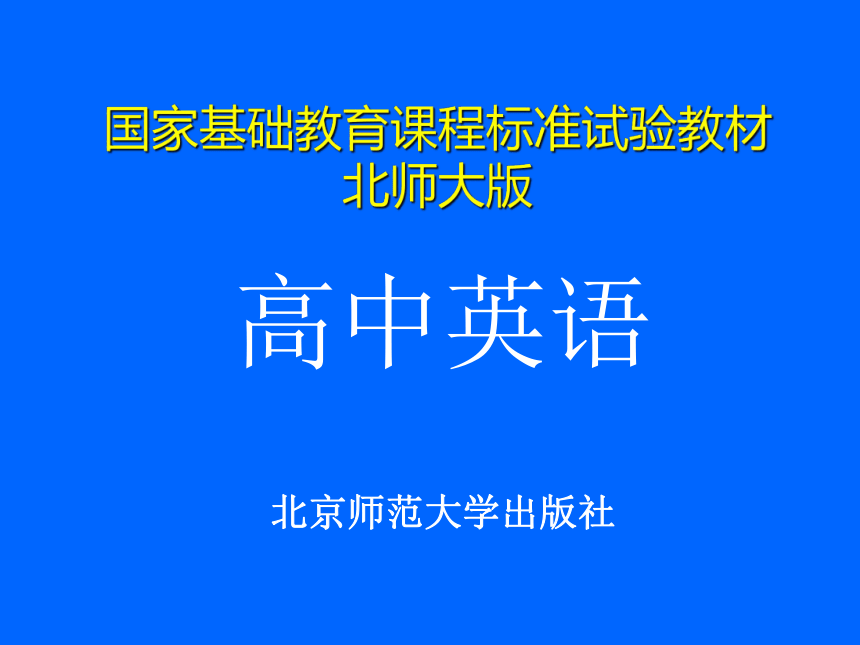
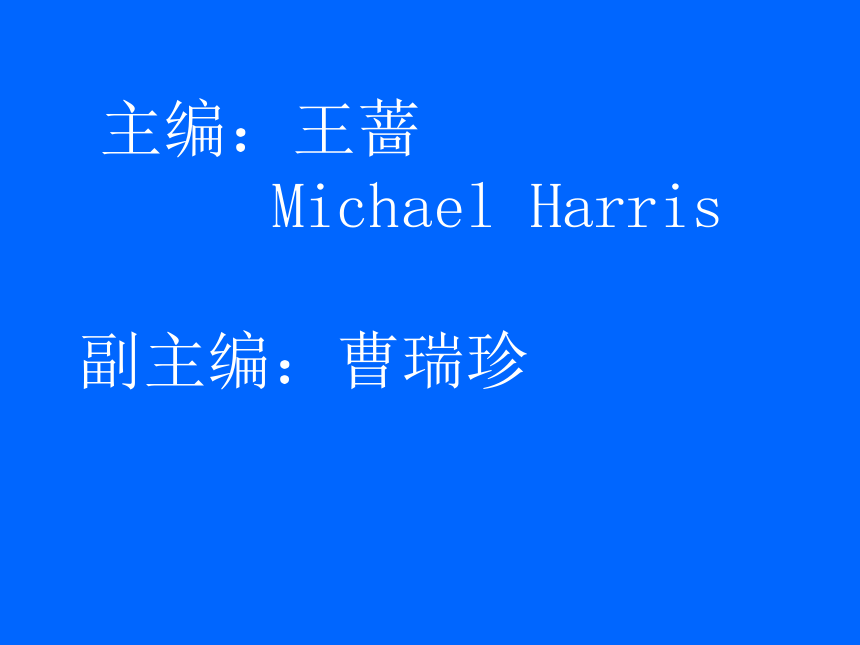
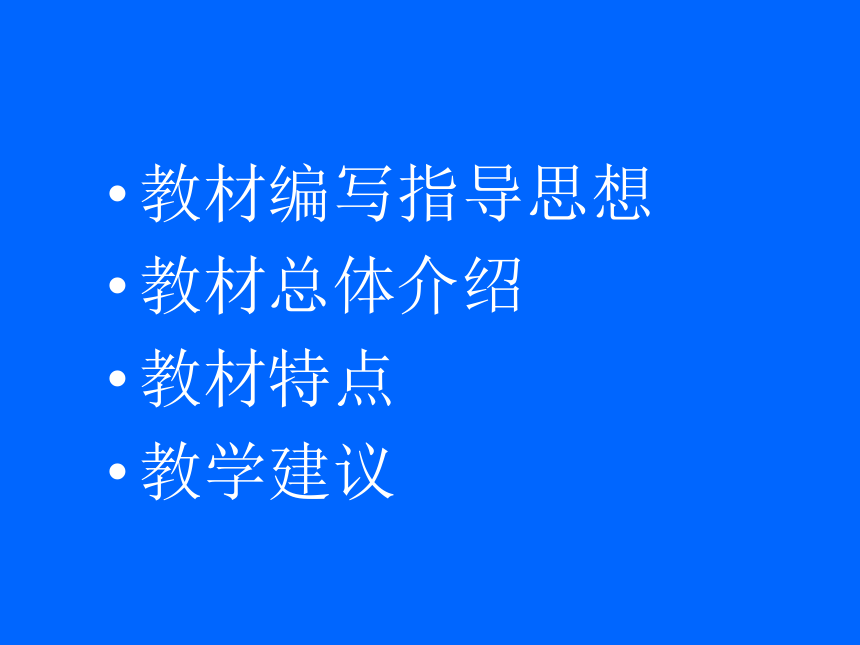

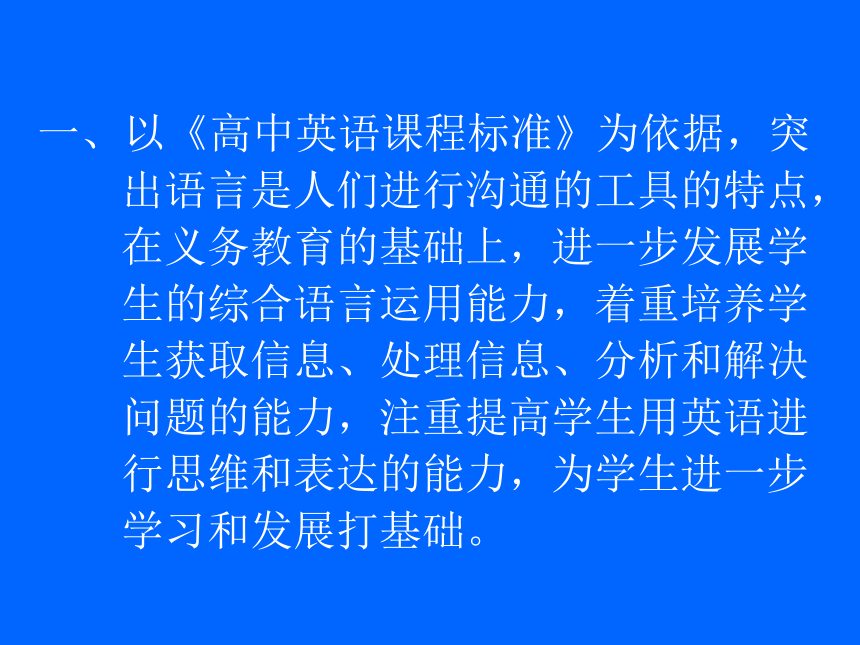
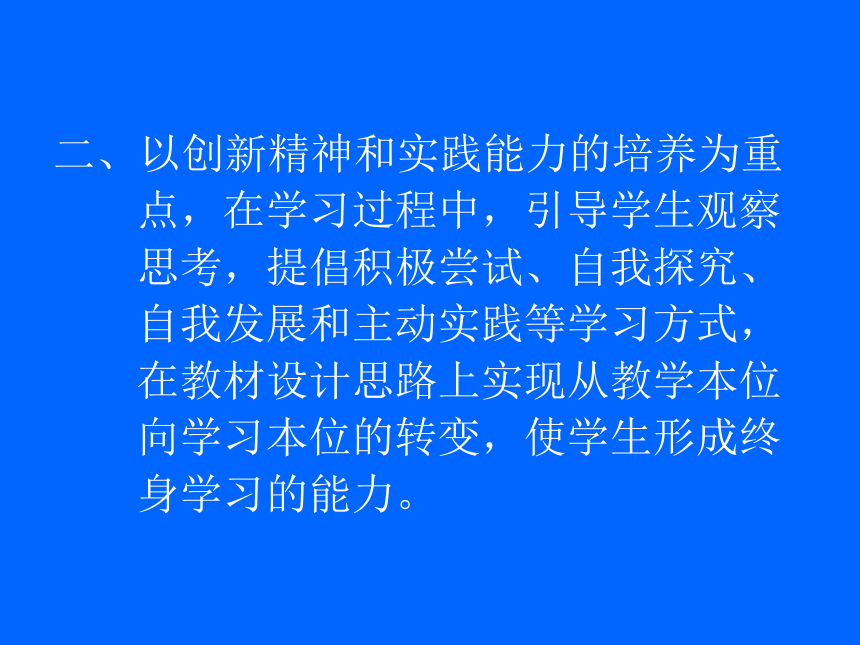
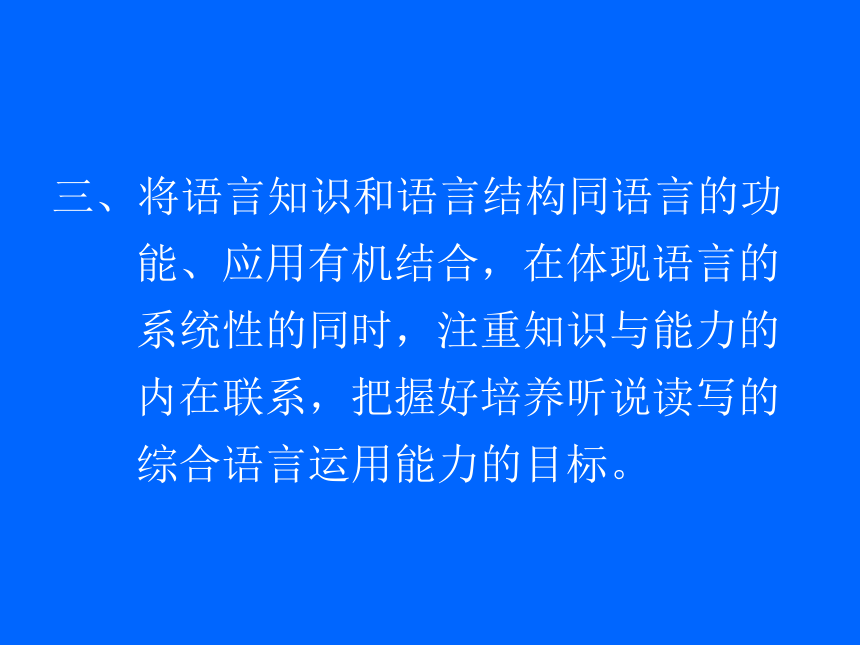
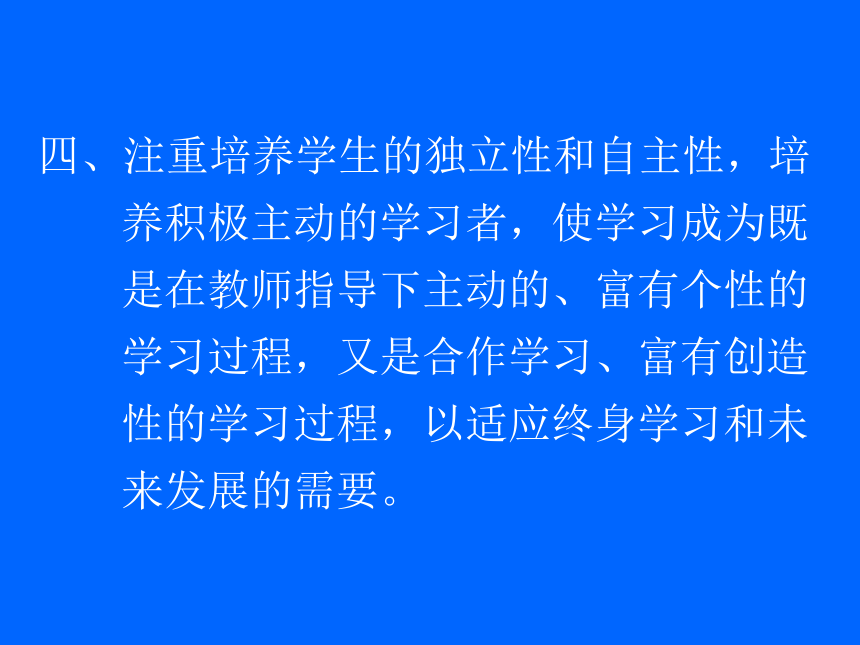
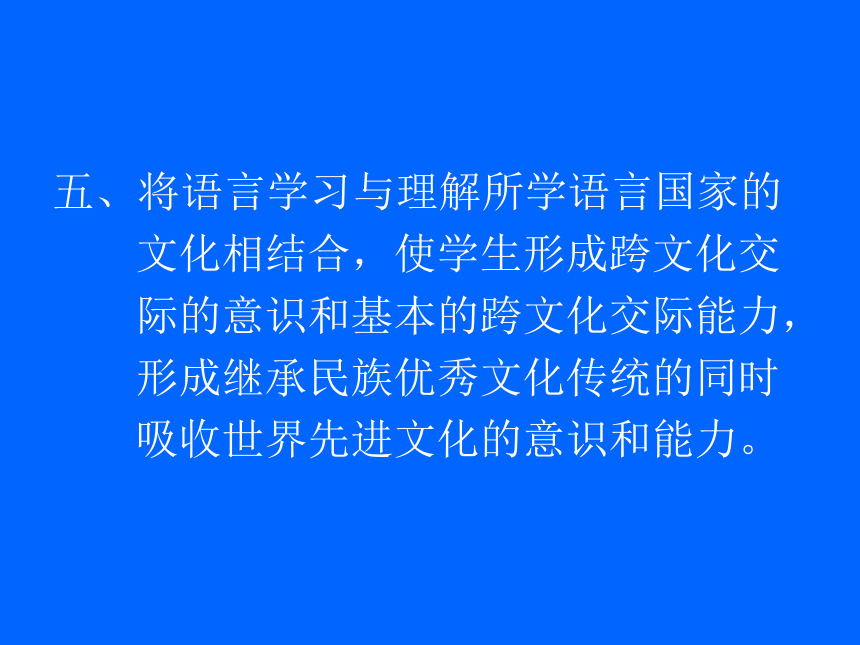
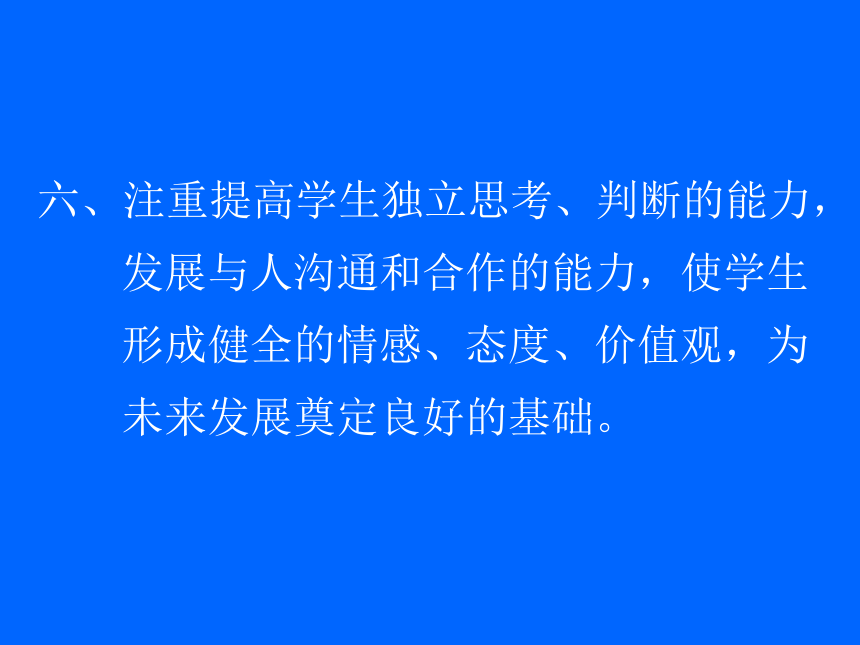
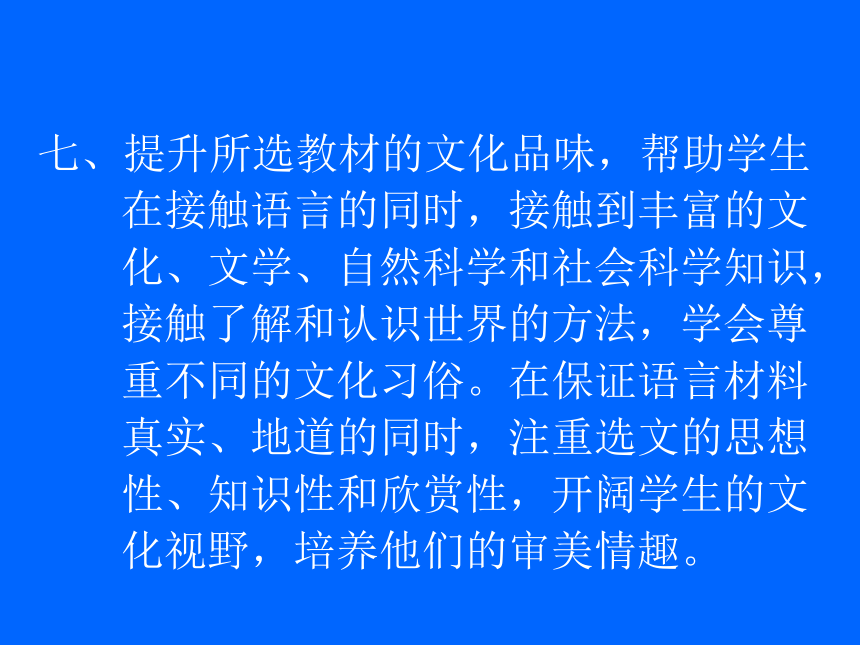
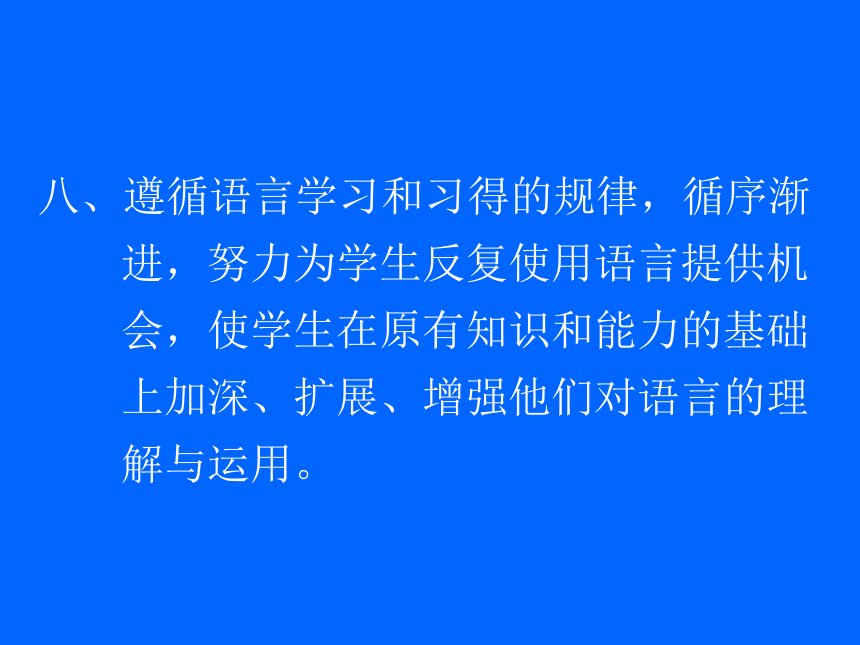
文档简介
课件81张PPT。国家基础教育课程标准试验教材
北师大版 高中英语
北京师范大学出版社 主编:王蔷 Michael Harris 副主编:曹瑞珍 教材编写指导思想
教材总体介绍
教材特点
教学建议
教材编写指导思想一、以《高中英语课程标准》为依据,突 出语言是人们进行沟通的工具的特点,在义务教育的基础上,进一步发展学生的综合语言运用能力,着重培养学生获取信息、处理信息、分析和解决问题的能力,注重提高学生用英语进行思维和表达的能力,为学生进一步学习和发展打基础。二、以创新精神和实践能力的培养为重点,在学习过程中,引导学生观察思考,提倡积极尝试、自我探究、自我发展和主动实践等学习方式,在教材设计思路上实现从教学本位向学习本位的转变,使学生形成终身学习的能力。三、将语言知识和语言结构同语言的功能、应用有机结合,在体现语言的系统性的同时,注重知识与能力的内在联系,把握好培养听说读写的综合语言运用能力的目标。四、注重培养学生的独立性和自主性,培养积极主动的学习者,使学习成为既是在教师指导下主动的、富有个性的学习过程,又是合作学习、富有创造性的学习过程,以适应终身学习和未来发展的需要。五、将语言学习与理解所学语言国家的文化相结合,使学生形成跨文化交际的意识和基本的跨文化交际能力,形成继承民族优秀文化传统的同时吸收世界先进文化的意识和能力。
六、注重提高学生独立思考、判断的能力,发展与人沟通和合作的能力,使学生形成健全的情感、态度、价值观,为未来发展奠定良好的基础。七、提升所选教材的文化品味,帮助学生在接触语言的同时,接触到丰富的文化、文学、自然科学和社会科学知识,接触了解和认识世界的方法,学会尊重不同的文化习俗。在保证语言材料真实、地道的同时,注重选文的思想性、知识性和欣赏性,开阔学生的文化视野,培养他们的审美情趣。八、遵循语言学习和习得的规律,循序渐进,努力为学生反复使用语言提供机会,使学生在原有知识和能力的基础上加深、扩展、增强他们对语言的理解与运用。教材总体介绍 1. 按模块设计
模块 1 (必修)模块 2 (必修)模块 3 (必修)模块 4 (必修)模块 5 (必修)模块 6 (选修)模块 7 (选修)模块 8 (选修) 2. 模块主题
Module 1
Different Lifestyles, Values & Attitudes
Lifestyles
Heroes and Their Life Attitudes
Festival Celebrations
Module 2
Modern Technology and Modern Art
The Internet
Music & Dance
Painting & Architecture
Module 3
Explorations & Nature
Exploring the Sea, the Land and the future
Protecting the Environment
Scientific Advances
History & Geography
Module 4
The Material World & Social and Cultural Life
Attitudes towards Money
Shopping & Bargaining
News and Newspapers
Fame and Privacy
Advertising
Culture Shock and Good MannersModule 5
Personal Development and
Life-long Learning
Personality, Careers, Job Trends
Education and Life-long LearningModule 6Humor and Literary Appreciation
Stories, Humor, Poetry and
MusicModule 7 Science, Communication and Technology
Language, Future Technology, Inventions and Medical Advances Module 8Social Issues &
Conflicts
Environment, Changing Society
and Conflicts 3. 模块、单元结构 grammarvocabularylisteningReadingWarm-upProjectLearning to learnLiterature spotLanguage powerCulture cornerBulletin boardUnit DiaryLanguage focusSkill focusGuided speaking & writing practiceUnit 1Unit 2Unit 3Communication work shopLesson 1
Lesson 2
Lesson 3
Lesson 4 模块Writing Help
Grammar Summary
Notes to the texts
Word ListUnit Opener 教材特点1. Topic-based units
i) Topics related to the student’s own world
ii) Cross-curricular themes
Science – information technology/ the history of the Internet/ the effect of technology on our lives; different kinds of marine
The Arts – different kinds of music and dance; painting and architecture
Business – dealing with money/awareness of consumerism and the importance of moral values/advertising
Social Studies – serious social issues such as homelessness, disability and racism; fame and advertising game
iii) Cultural input2. Clear objectives, clear outcomes
The units
Stage 1 – Warm-up
Stage 2 – Four main input lessons
Stage 3 – Performance
Stage 4 – Review/reflectionb) The lessons
Stage 1 – Before you start
Stage 2 – Main input
Stage 3 – Main performance c) The tasks
Before you start
Stage 1 – Preparation
Stage 2 – Performance
Stage 3 – Reflection
3. Process approach
to skills
i) Strategies
ii) Staging
iii) Integration of skills4. Comprehensive skills developmentReading:
text types, task types, Reading Strategies, Focus on reading, Literature Spots
ii) Listening:
Text types, task types, Listening Strategies
iii) Writing:
text types, Strategies
Writing workshops: model texts, linking areas
Writing Help: Layout, Linking, Checking
iiii) Speaking:
Functions, Speaking Workshops, Speaking Strategies 5. Discovery approach to
grammar
i) Language Input
ii) Presentation
iii) Practice
iiii) Language in Use 6. A three-dimensional
approach to vocabulary
i) Dealing with vocabulary in
context
ii) Learning vocabulary in context
iii) Using vocabulary in context
7. Pronunciation
8. Recycling
i) across levels
ii) across units
iii) across lessons
9. Culture
Comparing culture
Quote…Unquote
Culture corners
Literature spots
Function file
10. Learner Development
Learning to learning
Unit objectives
Strategy boxes
Project
Key word bank, word tip, word power, word corner
Check your progress
Bulletin board
Unit diary
Writing help
Grammar Summary
教学建议GrammarEncourage Individual grammar notes.
Develop reference skills.
Get students to work out grammar rules themselves.
Don’t worry when students say “We’ve done it before!”
Top ten most typical mistakes in the class.
Get students to produce language tests.
Vocabulary Familiarise students with the Lexicon.
Get students to select vocabulary.
Focus on strategies for learning vocabulary.
Give students time for vocabulary books in class.
Use vocabulary books as fillers.
Set out vocabulary bags.
ReadingEncouraging guessing and prediction.
Encouraging guessing of meaning.
Encourage inference.
Focus on style.
Develop dictionary skills.
Only focus on key words in texts.
Encourage extensive reading outside the class.
Use Strategies boxes for revision.ListeningReduce “cassette fear”.
Prepare thoroughly before listening.
Be aware of listening difficulties.
Reduce panic.
Concentrate on task achievement.
Be aware of variety.
Evaluate the text.
Don’t stick to the cassette.
Use Strategies boxes for revision.
SpeakingBefore you start.
Give preparation time.
Encourage individual practice.
Encourage interactive communication.
Reward effort and participation in speaking activities.
Give marks for oral performance.
Only correct afterwards.
Get students to make a list of difficult words to pronounce.WritingFamiliarise students with the Writing Help.
Try out some written tasks in pairs/groups.
Make criteria clear.
Always make sure that students know why they are writing and who they are writing to.
Emphasise the importance of the planning stage.
Make sure students check their writing.
Make sure that compositions are read.
Use correction codes.
Give feedback about the coherence (organization) and cohesion (e.g. linking/punctuation) of students’ texts and only on accuracy.
Focus on style.Learner developmentSee learner development as investment.
Self-study features.
Encourage students to keep learner diaries.
Use the module objectives.
Time for reflection.
Link self-assessment with your own assessment.
联系我们曹瑞珍 王 源
北京师范大学出版社
010-58807669
bnupress@263.net
Thank you!bnupress@263.net
北京师范大学出版社 主编:王蔷 Michael Harris 副主编:曹瑞珍 教材编写指导思想
教材总体介绍
教材特点
教学建议
教材编写指导思想一、以《高中英语课程标准》为依据,突 出语言是人们进行沟通的工具的特点,在义务教育的基础上,进一步发展学生的综合语言运用能力,着重培养学生获取信息、处理信息、分析和解决问题的能力,注重提高学生用英语进行思维和表达的能力,为学生进一步学习和发展打基础。二、以创新精神和实践能力的培养为重点,在学习过程中,引导学生观察思考,提倡积极尝试、自我探究、自我发展和主动实践等学习方式,在教材设计思路上实现从教学本位向学习本位的转变,使学生形成终身学习的能力。三、将语言知识和语言结构同语言的功能、应用有机结合,在体现语言的系统性的同时,注重知识与能力的内在联系,把握好培养听说读写的综合语言运用能力的目标。四、注重培养学生的独立性和自主性,培养积极主动的学习者,使学习成为既是在教师指导下主动的、富有个性的学习过程,又是合作学习、富有创造性的学习过程,以适应终身学习和未来发展的需要。五、将语言学习与理解所学语言国家的文化相结合,使学生形成跨文化交际的意识和基本的跨文化交际能力,形成继承民族优秀文化传统的同时吸收世界先进文化的意识和能力。
六、注重提高学生独立思考、判断的能力,发展与人沟通和合作的能力,使学生形成健全的情感、态度、价值观,为未来发展奠定良好的基础。七、提升所选教材的文化品味,帮助学生在接触语言的同时,接触到丰富的文化、文学、自然科学和社会科学知识,接触了解和认识世界的方法,学会尊重不同的文化习俗。在保证语言材料真实、地道的同时,注重选文的思想性、知识性和欣赏性,开阔学生的文化视野,培养他们的审美情趣。八、遵循语言学习和习得的规律,循序渐进,努力为学生反复使用语言提供机会,使学生在原有知识和能力的基础上加深、扩展、增强他们对语言的理解与运用。教材总体介绍 1. 按模块设计
模块 1 (必修)模块 2 (必修)模块 3 (必修)模块 4 (必修)模块 5 (必修)模块 6 (选修)模块 7 (选修)模块 8 (选修) 2. 模块主题
Module 1
Different Lifestyles, Values & Attitudes
Lifestyles
Heroes and Their Life Attitudes
Festival Celebrations
Module 2
Modern Technology and Modern Art
The Internet
Music & Dance
Painting & Architecture
Module 3
Explorations & Nature
Exploring the Sea, the Land and the future
Protecting the Environment
Scientific Advances
History & Geography
Module 4
The Material World & Social and Cultural Life
Attitudes towards Money
Shopping & Bargaining
News and Newspapers
Fame and Privacy
Advertising
Culture Shock and Good MannersModule 5
Personal Development and
Life-long Learning
Personality, Careers, Job Trends
Education and Life-long LearningModule 6Humor and Literary Appreciation
Stories, Humor, Poetry and
MusicModule 7 Science, Communication and Technology
Language, Future Technology, Inventions and Medical Advances Module 8Social Issues &
Conflicts
Environment, Changing Society
and Conflicts 3. 模块、单元结构 grammarvocabularylisteningReadingWarm-upProjectLearning to learnLiterature spotLanguage powerCulture cornerBulletin boardUnit DiaryLanguage focusSkill focusGuided speaking & writing practiceUnit 1Unit 2Unit 3Communication work shopLesson 1
Lesson 2
Lesson 3
Lesson 4 模块Writing Help
Grammar Summary
Notes to the texts
Word ListUnit Opener 教材特点1. Topic-based units
i) Topics related to the student’s own world
ii) Cross-curricular themes
Science – information technology/ the history of the Internet/ the effect of technology on our lives; different kinds of marine
The Arts – different kinds of music and dance; painting and architecture
Business – dealing with money/awareness of consumerism and the importance of moral values/advertising
Social Studies – serious social issues such as homelessness, disability and racism; fame and advertising game
iii) Cultural input2. Clear objectives, clear outcomes
The units
Stage 1 – Warm-up
Stage 2 – Four main input lessons
Stage 3 – Performance
Stage 4 – Review/reflectionb) The lessons
Stage 1 – Before you start
Stage 2 – Main input
Stage 3 – Main performance c) The tasks
Before you start
Stage 1 – Preparation
Stage 2 – Performance
Stage 3 – Reflection
3. Process approach
to skills
i) Strategies
ii) Staging
iii) Integration of skills4. Comprehensive skills developmentReading:
text types, task types, Reading Strategies, Focus on reading, Literature Spots
ii) Listening:
Text types, task types, Listening Strategies
iii) Writing:
text types, Strategies
Writing workshops: model texts, linking areas
Writing Help: Layout, Linking, Checking
iiii) Speaking:
Functions, Speaking Workshops, Speaking Strategies 5. Discovery approach to
grammar
i) Language Input
ii) Presentation
iii) Practice
iiii) Language in Use 6. A three-dimensional
approach to vocabulary
i) Dealing with vocabulary in
context
ii) Learning vocabulary in context
iii) Using vocabulary in context
7. Pronunciation
8. Recycling
i) across levels
ii) across units
iii) across lessons
9. Culture
Comparing culture
Quote…Unquote
Culture corners
Literature spots
Function file
10. Learner Development
Learning to learning
Unit objectives
Strategy boxes
Project
Key word bank, word tip, word power, word corner
Check your progress
Bulletin board
Unit diary
Writing help
Grammar Summary
教学建议GrammarEncourage Individual grammar notes.
Develop reference skills.
Get students to work out grammar rules themselves.
Don’t worry when students say “We’ve done it before!”
Top ten most typical mistakes in the class.
Get students to produce language tests.
Vocabulary Familiarise students with the Lexicon.
Get students to select vocabulary.
Focus on strategies for learning vocabulary.
Give students time for vocabulary books in class.
Use vocabulary books as fillers.
Set out vocabulary bags.
ReadingEncouraging guessing and prediction.
Encouraging guessing of meaning.
Encourage inference.
Focus on style.
Develop dictionary skills.
Only focus on key words in texts.
Encourage extensive reading outside the class.
Use Strategies boxes for revision.ListeningReduce “cassette fear”.
Prepare thoroughly before listening.
Be aware of listening difficulties.
Reduce panic.
Concentrate on task achievement.
Be aware of variety.
Evaluate the text.
Don’t stick to the cassette.
Use Strategies boxes for revision.
SpeakingBefore you start.
Give preparation time.
Encourage individual practice.
Encourage interactive communication.
Reward effort and participation in speaking activities.
Give marks for oral performance.
Only correct afterwards.
Get students to make a list of difficult words to pronounce.WritingFamiliarise students with the Writing Help.
Try out some written tasks in pairs/groups.
Make criteria clear.
Always make sure that students know why they are writing and who they are writing to.
Emphasise the importance of the planning stage.
Make sure students check their writing.
Make sure that compositions are read.
Use correction codes.
Give feedback about the coherence (organization) and cohesion (e.g. linking/punctuation) of students’ texts and only on accuracy.
Focus on style.Learner developmentSee learner development as investment.
Self-study features.
Encourage students to keep learner diaries.
Use the module objectives.
Time for reflection.
Link self-assessment with your own assessment.
联系我们曹瑞珍 王 源
北京师范大学出版社
010-58807669
bnupress@263.net
Thank you!bnupress@263.net
同课章节目录
